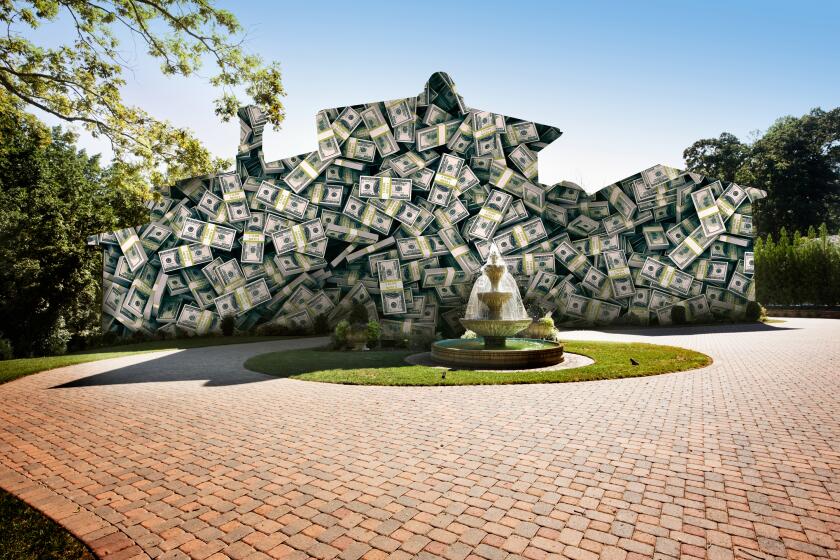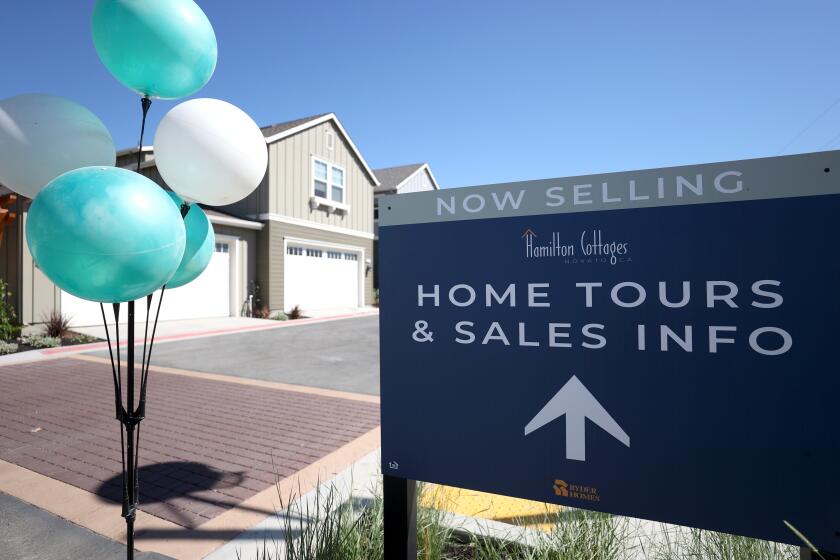Home price rise fuels fear of boom mentality
Sharp home price increases — particularly in once-decimated cities such as Phoenix and Las Vegas — are raising concern among some economists that speculation could return to certain markets if such double-digit gains continue.
Prices jumped 22.8% in Phoenix and 10% in Las Vegas in a year, according to November data released Tuesday from the S&P;/Case-Shiller indexes. Such increases could fuel a short-term mind-set, economists warned. California cities are also on the upswing, with San Diego rising 8%, Los Angeles up 7.7% and San Francisco increasing 12.7%.
Those gains are likely to grow when data for December are reported next month, economists said.
“It’s been a real roller-coaster,” said Karl E. Case, one of the creators of the index. “And there is a danger of igniting it again.”
The Case-Shiller index is widely considered the most reliable read on home values. The housing index compares the latest sales of detached houses with previous sales, then accounts for factors such as remodeling that might affect a house’s sale price over time.
Nineteen of the 20 cities tracked by S&P;/Case-Shiller posted year-over-year gains in November. The closely watched index rose 5.5% from the same month a year earlier. The strong increase signals that housing will probably continue its upward trajectory with tight supply and strong demand. The only metro area that declined during the 12 months reported on was New York, which fell 1.2%, according to the survey.
Some signs of consumer woe emerged Tuesday, even as major stock indexes flirted with new highs. Consumer confidence fell in January, reflecting concern over a hike in the payroll tax. And although home prices are rising, homeownership is slipping, an indication that well-heeled investors are playing a bigger part in fueling the market’s rebound than traditional buyers. The Census Bureau said Tuesday that national homeownership fell 0.6% to 65.4% in the fourth quarter compared with a year earlier.
The census data point to a hard reality for many buyers these days: Getting a conventional home loan from a bank remains difficult because banks have tightened their standards since the bust. Getting a property appraised at a negotiated sales price also remains difficult. Both factors have led sellers to turn to investors who have all-cash offers.
Although it may be hard to imagine another boom-town mentality taking off in the West, the sharp rise in prices makes the possibility ever more real, said Case, a professor at Wellesley College in Massachusetts.
One concern, he said, is that limited inventory will drive prices up and lead buyers to overextend themselves while competing with other buyers for a property. Then if prices declined again, people would be left with homes that could be worth far less than they paid.
Other economists also advised caution in the fast-rising markets.
“It does concern me a bit,” said Zillow.com chief economist Stan Humphries. “It encourages people to think about housing as a short-term investment.”
The other creator of the index, Robert J. Shiller of Yale University, said that prices, when adjusted for inflation, have not risen as sharply as the big percentage increases may indicate, particularly in cities such as Phoenix. Those increases indicate that prices may have fallen too far during the housing crash. Nevertheless, cities can enter into a collectively risky mind-set, Shiller said, a mentality to guard against.
“Phoenix became a boom city,” Shiller said. “I was there in 2004, and I remember everywhere people were talking about real estate, even the cab driver.”
The price jumps mask the continuing troubles of borrowers with underwater mortgages. In fact, the prices are driven in part by such homeowners being trapped in those homes, tightening supply.
Also helping home prices rise is a drop in foreclosure activity.
The rate at which lenders have foreclosed on mortgages in the Los Angeles area fell to 1.67% of all home loans in November, data firm CoreLogic said. That compares with 2.67% the same month a year ago. That rate was lower than the national average, which was 2.97% in November.
Despite concerns over fast-rising prices, many economists call the increases a welcome trend.
“Rising house prices, in turn, are supporting broader economic growth,” wrote PNC Financial economists Tuesday. “As house prices increase homeowners are wealthier, inducing them to spend a bit more. Rising house prices also support the banking system as losses diminish and homeowner equity increases.”
More to Read
Sign up for Essential California
The most important California stories and recommendations in your inbox every morning.
You may occasionally receive promotional content from the Los Angeles Times.






